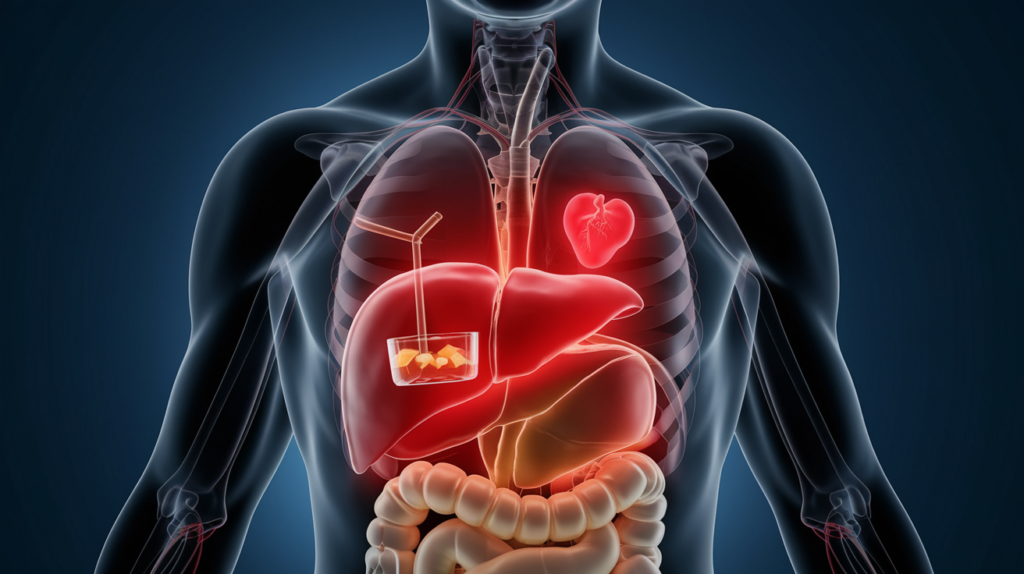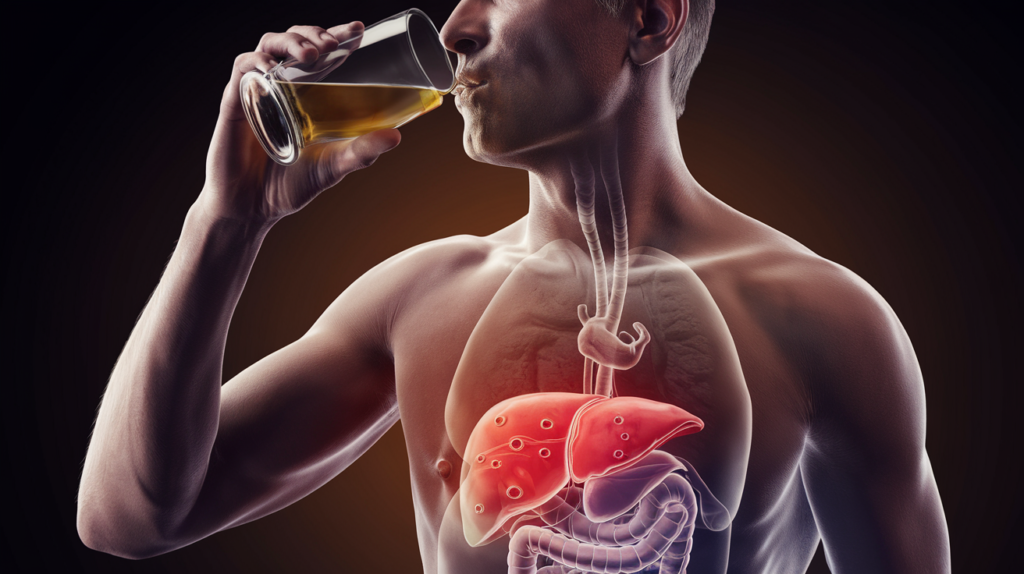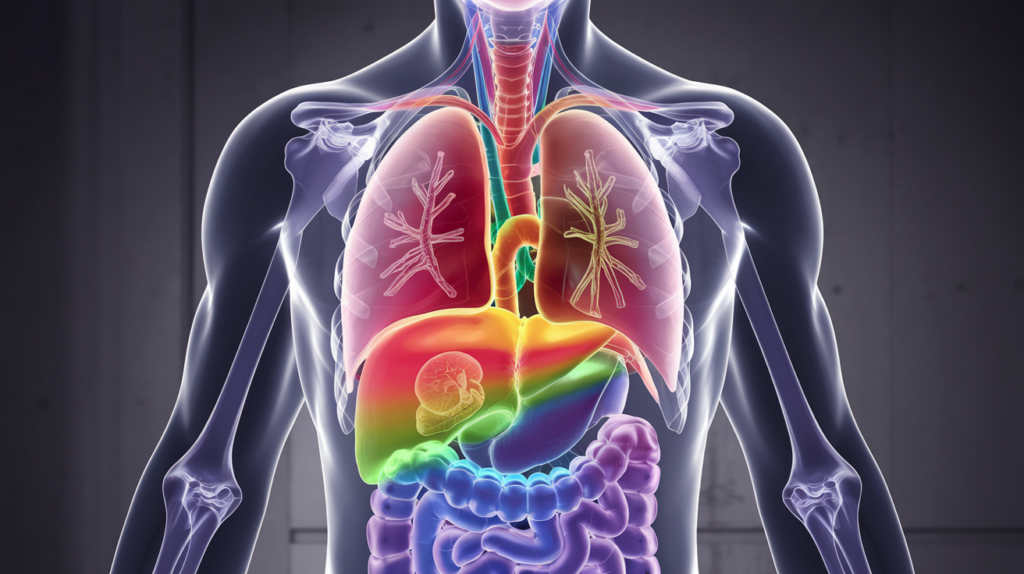Alcohol’s Assault on the Stomach
Alcohol’s effect on the stomach is alarmingly destructive. It robs the stomach of its ability to produce sufficient digestive fluids and compromises its capacity to properly absorb food. This leads to a distressing sensation of nausea, emptiness, exhaustion, and bloating – a constant companion of the alcoholic. This debilitating condition results in a general aversion to food, replaced by an unquenchable craving for more alcohol. Thus, a vicious cycle of permanent digestive disorder, or dyspepsia, is established.
The Liver’s Downward Spiral
The organ most frequently ravaged by prolonged alcohol consumption is the liver. Normally, the liver acts as a safehouse, sequestering and neutralizing harmful substances. But in alcoholics, the liver is perpetually saturated with alcohol, unable to ever fully purge its influence. The liver’s delicate membrane structure becomes impaired, disrupting proper filtration and secretion. It swells from dilated blood vessels, fluid buildup, and thickened tissue. As the liver contracts and its cells shrink, the lower body becomes waterlogged due to obstructed blood flow. The liver may even accumulate fatty deposits, a condition known as ‘fatty liver’.
Renal Deterioration
The kidneys also fall victim to heavy alcohol use. Their blood vessels lose elasticity and contractility. Their intricate internal structures undergo fatty degeneration. Albumin leaks through the compromised membranes, gradually draining the body of its vital fluids.
Pulmonary Congestion
Alcohol relaxes the lungs’ blood vessels, leaving them vulnerable to rapid congestion when exposed to temperature fluctuations. Alcoholics are thus highly susceptible to potentially fatal lung congestion, especially during cold weather.

The Failing Heart
Alcohol profoundly impairs the heart. Its protective membranes thicken, stiffen, and calcify. Heart valves lose their pliancy, leading to valvular disorders. The great blood vessels feeding the heart also suffer structural changes, losing elasticity and the ability to recoil and propel blood flow. Moreover, alcohol’s degenerative effects can replace the heart’s muscle fibers with fatty deposits or alter their contractile properties. Alcoholics often experience an insidious decline in the heart’s central pumping power, relieved only temporarily by alcohol or other stimulants – until the beleaguered heart can no longer be roused and the body’s blood flow collapses.
The Brain’s Deterioration
Alcohol’s destruction is not limited to the body’s vital organs – it also takes a heavy toll on the brain. Chronic alcohol abuse leads to a condition known as Wernicke-Korsakoff syndrome, characterized by confusion, vision problems, and profound memory loss. This is caused by a thiamine (vitamin B1) deficiency, as alcohol impairs the body’s ability to absorb and utilize this crucial nutrient.
The brain itself also undergoes structural changes. Alcohol’s neurotoxic effects can shrink the brain’s gray matter and damage the delicate white matter that enables communication between different brain regions. This neurodegeneration contributes to the cognitive impairments, mood disorders, and behavioral problems commonly seen in long-term alcoholics.
The Immune System Compromised
Alcohol’s insidious reach extends to the body’s defense mechanisms as well. Chronic alcohol consumption weakens the immune system, leaving the individual vulnerable to a host of infections and illnesses. Alcohol impairs the function of immune cells like lymphocytes and macrophages, reducing their ability to identify and eliminate threats. This immune system dysfunction heightens the risk of bacterial pneumonia, tuberculosis, HIV/AIDS progression, and certain cancers in alcoholics.
The Reproductive Toll
Alcohol’s devastation extends to the reproductive system. In men, it can lead to reduced testosterone levels, impaired sperm production, and erectile dysfunction. In women, it increases the risk of menstrual irregularities, infertility, and pregnancy complications like fetal alcohol spectrum disorders. Alcohol’s teratogenic effects can result in birth defects, developmental delays, and lifelong cognitive and behavioral impairments in the offspring of alcoholic mothers.

The Escalating Consequences
As the above examples illustrate, alcohol’s reach extends far beyond the societal stereotypes of the stumbling, sloppy drunk. Chronic, heavy alcohol consumption can systematically dismantle the body’s vital organs and physiological functions, leading to a cascade of debilitating and potentially fatal consequences. Urgent action and comprehensive treatment are essential to arrest this destructive process and restore health.
Neurological Deterioration
Alcohol’s corrosive effects extend deep into the nervous system, causing widespread neurological damage. Chronic alcohol abuse leads to a condition known as Wernicke-Korsakoff syndrome, characterized by confusion, vision problems, and severe memory impairment. This is caused by a deficiency in thiamine (vitamin B1), as alcohol impairs the body’s ability to absorb and utilize this crucial nutrient.
The brain itself undergoes structural changes, with alcohol’s neurotoxic effects shrinking the brain’s gray matter and damaging the delicate white matter that enables communication between different brain regions. This neurodegeneration contributes to the cognitive deficits, mood disorders, and behavioral problems commonly seen in long-term alcoholics.
Peripheral Nerve Damage
Alcohol’s destruction is not limited to the central nervous system. It also takes a heavy toll on the peripheral nerves, leading to a condition called alcoholic neuropathy. This manifests as numbness, tingling, and weakened sensation in the extremities, as well as impaired reflexes and coordination. Over time, the damage can progress to severe pain, muscle wasting, and even paralysis in the affected limbs.

Circulatory Chaos
Alcohol’s impact extends to the cardiovascular system as well. It can lead to hypertension, irregular heart rhythms, and cardiomyopathy – a weakening and enlargement of the heart muscle. This compromises the heart’s ability to effectively pump blood, leading to congestive heart failure. Alcohol also increases the risk of stroke by promoting the buildup of fatty deposits in the arteries.
Endocrine Disruption
Chronic alcohol consumption can disrupt the delicate balance of the endocrine system, leading to a cascade of hormonal imbalances. In men, it can reduce testosterone levels, impair sperm production, and contribute to erectile dysfunction. In women, it increases the risk of menstrual irregularities, infertility, and pregnancy complications like fetal alcohol spectrum disorders.
The compounding nature of alcohol’s devastation on the body’s systems underscores the urgent need for comprehensive treatment and lifestyle changes to arrest this destructive process. Without intervention, the consequences of alcohol abuse can be catastrophic, robbing individuals of their health, cognitive abilities, and quality of life.
For More Articles Browse Our Blog.
